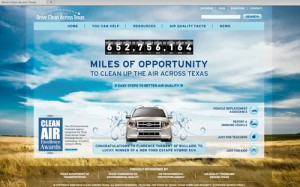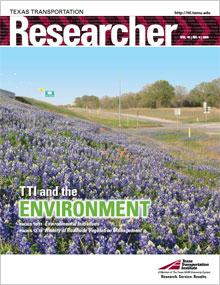
Think back roughly eight years ago — where were you? Some that were graduating high school are now out of college and in the work force, and fifth graders at that time are now in college. The Drive Clean Across Texas (DCAT) campaign was in its infancy then but now stands as an award-winning education and outreach campaign.
Officially launched in May 2002, DCAT was the nation’s first statewide air quality public outreach and education campaign. Co-sponsored by the Texas Department of Transportation (TxDOT) and the Texas Commission on Environmental Quality (TCEQ), the campaign was designed to raise awareness and change attitudes about air pollution. Researchers from the Texas Transportation Institute (TTI), as well as staff from TTI Communications, have worked in a productive partnership with Sherry Matthews Advocacy Marketing to do just that.
“Eight years ago air quality was not a concern for most Texans,” explains TTI Associate Research Scientist and project supervisor for DCAT Laura Higgins. “The process of raising the public’s awareness and then educating them on how they can help make a difference in air quality has been a challenging but successful venture.”
This success is seen in the campaign’s performance. In a 2003 survey conducted by the Bush School of Government and Public Service at Texas A&M University, 23.7 percent of those surveyed had heard of an air quality campaign. By 2007, 40.6 percent of those surveyed were aware of the DCAT campaign specifically. Similarly, in 2003 only 25 percent of survey respondents reported that they had made one or more changes in their behavior (car pooling, using public transportation, properly maintaining their vehicle, checking tire pressure or reducing idling, for example), but by 2008 that number grew to 62.8 percent.
TTI Associate Research Editor Chris Sasser has seen the changes firsthand.
“When I first began working DCAT outreach events, some people were defensive about the topic of air quality, but now the public is much more aware and educated about air quality concerns,” he says.
Further evidence of the campaign’s success came in 2007, when the U.S. Environmental Protection Agency (EPA) awarded DCAT its annual Clean Air Excellence Award for Outreach/Education.
The challenge now is to carry this success forward. New EPA regulations for air quality standards are on the horizon, and several regions of Texas will struggle to meet these requirements. Fortunately, help should be on the way in the form of those fifth graders mentioned earlier. In addition to educating the general public, DCAT has been helping educate Texas children of all grade levels about how vehicles contribute to air pollution.
“DCAT‘s curriculum educates, informs and inspires young Texans to adopt air-friendly habits as they become the drivers of tomorrow,” says Richard Goldsmith, public information officer with TxDOT‘s Environmental Affairs Division, which manages the campaign. “The success of DCAT over the last eight years has been fantastic, and the campaign’s efforts with Texas children will undoubtedly help carry that success forward for years to come.”
